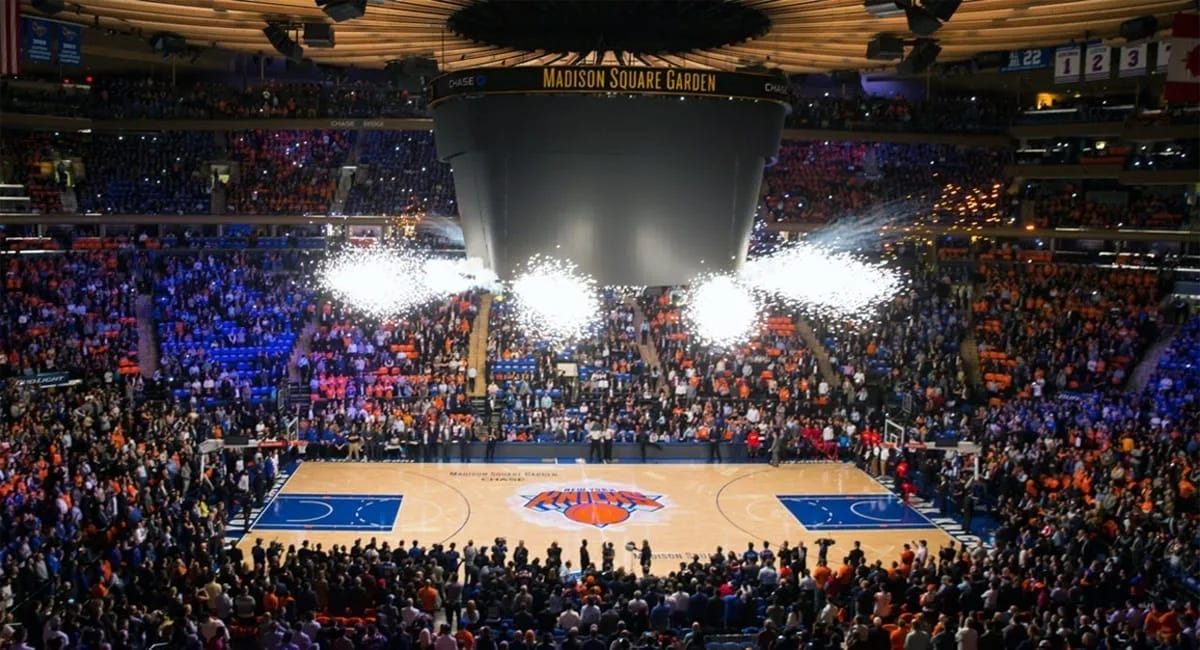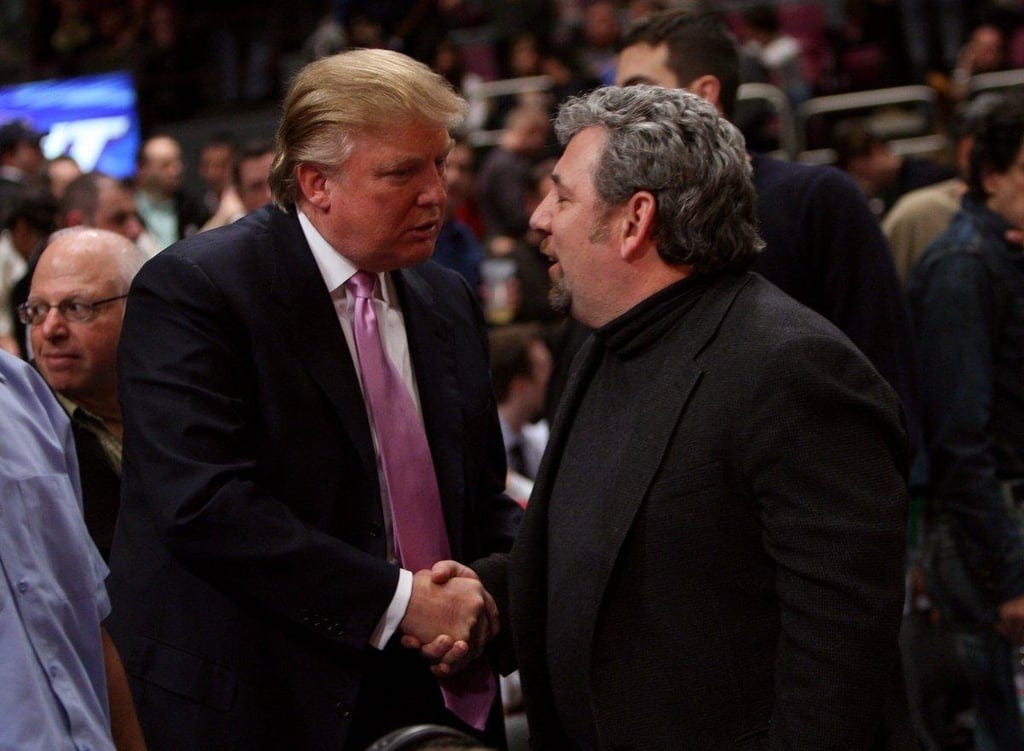The Knicks, New York, and the politics of collective joy
In this guest essay, Bobby Crace reflects on the Knicks as a civic bond for New Yorkers, and on the tension between collective fandom and the politics of the team’s ownership.
Welcome to Sports Politika, a media venture founded by investigative journalist and researcher Karim Zidan that strives to help you understand how sports and politics shape the world around us. My mission is to offer an independent platform for accessible journalism that raises awareness and empowers understanding.
If you share this vision, please consider supporting my work by joining becoming a paid subscriber. I am currently running a special offer whereby you can secure a subscription at a 40% discounted price…forever.
It’s the first week of the NBA season, and it took me a couple of days to remember why I’m a Knicks fan. Before Wednesday’s opener against the Cleveland Cavaliers, I had those first-day-of-school jitters: happy to see familiar faces, but not ready for the roller coaster ahead.
“Knicks fire Tom Thibodeau despite run to Eastern Conference finals”
Is this what the New York Knicks envisioned after acquiring Mikal Bridges? Giving up an unprecedented five first-round picks …Providing the third-worst Defensive Rating of his career since his rookie year, and is afraid of contact on both ends of the floor.
These are typical concerns fans of any team experience, but they were amplified in my mind because of an ethical compromise that I’m constantly struggling: my love for watching Knicks basketball (literally one of the only activities that calms my brain and heart) versus a moral aversion for Knicks owner, Jimmy Dolan.
Not only has Dolan’s tenure as owner some of the team’s worst seasons, but Dolan is an ardent Trump supporter: “$300,000 to a Trump-supporting PAC. The next year, he re-upped with a $125,000 donation to a Trump fundraising committee.” Dolan also availed Madison Square Garden, “the world’s most famous arena…as one of the final stops in [Trump’s] third presidential campaign… one adviser told The Wall Street Journal… it will be ‘the biggest Trump rally we’ve ever seen.’”
On the Wednesday before the first Knicks game. I found myself stacking reasons to skip this season: “I don’t need to buy another streaming app;” “There are more important places to devote my outrage;” “Am I really going to spend my extra time being upset about the Knicks?”
When I got home that night, my wife had already purchased a sports streaming app and had the game playing. I sat down hesitantly, denying the thrill of seeing the game’s pace, the acrobatics, the Madison Square Garden energy coming through the screen. I resisted the appeal even when Jalen Brunson hit that first corner three. But minutes later, when Hukporti blocked a Jarrett Allen layup, I was out of my seat cheering. All around me, in neighboring apartments, I heard the same.
Dolan, “self-proclaimed King of Madison Square Garden,” also uses facial-recognition software to enact personal vendettas as he did with Kelly Conlon “[a] lawyer employed by a firm involved in a personal injury claim against” one of Dolan’s businesses. Conlon was taking her daughter’s Girl Scout troop on a field trip the Rockettes Christmas show when she was “prevented from entering.” Conlon told reporters: “over an intercom or loudspeaker, I heard them say, ‘Woman with long dark hair and a grey scarf.’ Conlon said she was asked her name and to produce identification. ‘I believe they said that “Our recognition picked you up,”’ she said. ‘They knew my name before I told them.’”
While the collective cheers I heard watching the Knicks win their first game had me leaning toward another season of Knicks fandom, it wasn’t until the day after that I remembered why being a Knicks fan is truly important to me: It was a Thursday and I was pinballing all over the city, trying to put out work fires. It was one of those days when nothing goes right. As soon as one problem was resolved, another popped up. In the middle of the madness, I hopped on the F train, running late for a meeting. A stranger saw my Knicks hat and without any introductions, came up to me as if in mid-conversation: “Mike knows how to use Bridges off the ball.”
I responded as if I’d known this guy my whole life: “You’re not worried about him and KAT are afraid of physical contact?”
“No, man, don’t buy that hate.”
Our Knicks hats bobbed and weaved with the conversation. One counseling the other.
I said I was worried that this season was going to be a complete disaster.
“Lock it up, man. They won.” My new friend gave me some tough love. It was familial—like he knew I could take it. “Start believing.”
For the past couple of days, I’ve been saying the guy’s line like a mantra: Lock it up, man. Start Believing.
It has made a difference.
I’m a white guy from Virginia who’s lived in New York for twenty years. The Knicks have single-handedly primed hundreds of friendships, acquaintances, and impromptu conversations with people from all over the world, with every type of ethnic background or religious affiliation, folks identifying across fluid gender and sexuality spectrums. New York is not a monolithic culture, and basketball has a more inclusive fanbase. Those factors intersect with the Knicks. The team is a salve when the community is hurting. It is an introduction when the community is fragmented. It is a collective hope when there is little else to cheer for.
The Knicks help me be in the city. They help us be with each other. And we may need that now more than ever.
This is a time when billionaires, like Knicks owner Jimmy Dolan, support politicians who are implementing authoritarian, xenophobic, racist, anti-woman, and anti-queer policies. These billionaires also contribute to economic divides that are squeezing the life out of so many. And while some point out the Dolan contributes to Democrats as well, he’s doing so because “[as] of Feb. 20, there were 5.1 million registered voters in New York City. Of those, 65% were Democrats and 11% were Republicans.” With Democrats winning the majority of the seats in local elections, “Dolan’s super PAC, The Coalition to Restore New York, has reported spending more than $230,000 so far this year” to support centrist and right-leaning Democrats “facing progressive challengers.”
Dolan’s support doesn’t always translate to success. His tenure as Knicks owner squeezed the life out of a once prominent franchise. Before Dolan took full control in 1999, the Knicks made deep playoff runs every season from 1988-2001. During that streak, they were thwarted by Michael Jordan’s Bulls five times in seven years and made the NBA Finals twice. Though, not long after Dolan took control of the team in 1999, the Knicks took a downward turn, only making short playoffs appearances five times from 2002 to 2022.
Former House Democrat Max Rose summed up the sentiment of Knicks fans when he said, “Nothing’s happening. Every year that they don’t make the playoffs, New York City loses out,” he told TMZ. “We lose a piece of our soul. Sell tomorrow. Sell today. Do it for the good of all of us, brother!
“In response, Dolan donated $50,000 to Republican candidate Nicole Malliotakis, who ended up beating Rose for his seat representing Staten Island and parts of southern Brooklyn.”
Despite twenty plus seasons of disappointment and moral conflict, I found myself as rabid as any fanatic, watching the Knicks muscle their way to last year’s conference finals—a playoff round they hadn’t reached in twenty-six seasons. No matter what Jimmy Dolan does with his political contributions, the Knicks represent an intersectionality, a bond, a thrill that goes far beyond his influence. The team isn’t really his. The team is more represented by the bonds that resonate out through the city.
At the end of my stressful Thursday, I came home, and one of my neighbors was trying to drag an old dresser down four flights of stairs. “You doing that by yourself?” I asked.
He was too out of breath to answer but nodded with a new, blacked-out Knicks hat on his head. I squeezed around the dresser to lift the top of the outdated, laughably heavy piece of furniture. Floor by floor, we carried the awkward dresser down the stairs. I could only see his Knicks hat floating about the furniture as we strained and twisted our backs around the turns, and I’m sure all he could see of me was my Knicks hat that’s about as old and beaten up as the dresser.
When we finally got the furniture out to the street, we shook hands and he said between heavy breaths, “We beat the Cavs, man.”
I nodded, huffing like I’d just spent the past two minutes guarding Evan Mobley.
We limped inside. “I’m Macho,” he introduced, pulling out his phone.
“Bobby,” I wheezed back.
He showed me pictures of him and his wife courtside during a recent preseason game.
“On the floor.” I congratulated.
“On the floor.”
“We ain’t gonna be physical enough this season,” I said as we walked back on the stairs.
Macho brushed off the idea. “No, man, Mike knows what he’s doing.” Then after a couple more steps, Macho added: “I’m a believer.”
As we made it up to our respective floors, Macho said: “Come over and watch a game sometime.”
Start believing.
The extent to which Knicks fandom can affect the daily and deep aspects of my life is truly special—beyond sports. While there are many people who gain power by exploiting our humanity, the Knicks remind me how available and powerful our collective humanity truly is. The fandom makes me enact my humanity and feel it in return from a wide range of people.
As Vinnie Goodwill said on The Right Time with Bomani Jones: “It was a Tuesday night in December… against the Toronto Raptors. And there was a possession in the second quarter where everybody in Madison Square Garden was on their feet. It wasn’t a big possession… It was just the second quarter with like eight minutes left, and they [Knicks fans] were on their feet… These people are crazy. Like they’re into it in a different way.”
It doesn’t matter if the Knicks have a losing record or if a star player is injured. No matter where or when… I want to cheer and connect with folks from all walks of life. I want to celebrate our humanity together. And during the Knicks season, I can do that on the subway, at MSG, or carrying a dresser down the stairs.
That’s why I’m a Knicks fan.
Bobby Crace teaches creative writing at Stony Brook University and ghostwrites. He is the Managing Editor of The Southampton Review and Fiction Editor at Moonlighting by Lit Pub. You can find his work in The Brooklyn Rail, Chicago Story Press, The Under Review, Mayday, and other journals. bobbycrace.com






I’m a Rockets fan & I enjoyed reading that article for the sole purpose that James Dolan needs to sell the Knicks.
Dude needs to take his overtly Republican stance out of basketball. If he doesn’t, the Knicks will continue to spiral into disarray regardless of on-court results.
Excellent read.